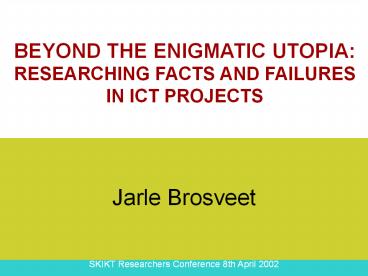BEYOND THE ENIGMATIC UTOPIA: RESEARCHING FACTS AND FAILURES IN ICT PROJECTS - PowerPoint PPT Presentation
1 / 20
Title:
BEYOND THE ENIGMATIC UTOPIA: RESEARCHING FACTS AND FAILURES IN ICT PROJECTS
Description:
FACTS AND NEW KNOWLEDGE ... Intended to follow the actions of developers and users (laboratory study) ... group dominance at work. socialization of researcher ... – PowerPoint PPT presentation
Number of Views:32
Avg rating:3.0/5.0
Title: BEYOND THE ENIGMATIC UTOPIA: RESEARCHING FACTS AND FAILURES IN ICT PROJECTS
1
BEYOND THE ENIGMATIC UTOPIARESEARCHING FACTS
AND FAILURES IN ICT PROJECTS
Jarle Brosveet
SKIKT Researchers Conference 8th April 2002
2
BEYOND THE ENIGMATIC UTOPIARESEARCHING FACTS
AND FAILURES IN ICT PROJECTS
- Jarle Brosveet
- jarle.brosveet_at_hf.ntnu.no
- Centre for Technology and Society
- Department for Interdisciplinary Studies of
Culture - Norwegian University of Science and Technology
(NTNU) - 7491 Trondheim, Norway
3
FACTS AND NEW KNOWLEDGE
- Interrelationship between users and developers
as experienced in three different Norwegian ICT
research projects by - assessing the attitudes and outlook of developers
and users - giving an appraisal of how various attitudes
influenced the outcome of these three research
projects - focusing on the systems engineering background of
designers of ICT systems.
4
RECENT EXPERIENCE
- Pros
- Systems engineering theory and practice is
currently undergoing rapid change so as to
encourage focus on social and cultural elements
vital to the successful completion of systems
engineering projects. - Cons
- Attitudes towards the outside social researcher
can be troublesome when it comes to investigating
the interrelationship between users and
developers.
5
HOW TO ESTABLISH FACTS?
- Problems
- No agreement as to who is responsible
- No agreement as to the shortcomings
- Claims change continually
- Facts appear to be highly negotiable
- Social constructivist approach (Latour)
- - role-definition strategies
- - scenario-building strategies
6
THREE PROJECTS
- The municipal service bureaux case
- 1950s-1990s Rise and fall
- The Fredrikstad electronic highway case
- 1997-1999 No rise
- The medical ICT case 2000-2001
- State of flux
7
MUNICIPAL SERVICE BUREAUX (1)
- Seven institutions for the outsourcing of
municipal ICT solutions - 1950s-1960s Success story
- 1960s-1980s Concept eroded with the introduction
of new technology and changes in user sentiment
8
MUNICIPAL SERVICE BUREAUX (2)
- Interviews
- Retired managing directors accused user-owners of
being uncooperative and acted as if the
interviewer were an investigator dispatched by
one of their previous user-owners.
9
FREDRIKSTAD ELECTRONIC HIGHWAY (1)
- Believed to contribute to increased industrial
activity in an economically backward region - 1997 Feasibility study completed with
participation of user groups - User groups specifications proved inconclusive
and major telecom provider, Telenor was called
upon - May 1999 Project terminated
10
FREDRIKSTAD ELECTRONIC HIGHWAY (2)
- Interviews
- Technocrats found to be blameworthy, user aspects
overlooked despite participation of user groups
11
MEDICAL ICT (1)
- Intended to follow the actions of developers and
users (laboratory study) - 2000 Denial to follow ORBIT project, denial to
follow KVALIS project - 2001 Patient statistics register project not
initiated - 2002 Feasibility study concerning electronic
patient journal research centre
12
MEDICAL ICT (2)
- No interviews, instead participatory research
- Technocrats uncooperative, so reliance on
participation in feasibility study within social
medicine
13
WHO'S AFRAID OF THE BIG BAD WOLF
- Municipal service bureaux case Developers not
entirely honest, users overstating criticism - Fredrikstad electronic highway Ambiguous sense
of guilt for terminating project - Medical ICT Developers uncooperative, users
mostly silent or indifferent
14
GREAT EXPECTATIONS (1)
- The incomplete learning process.
- Developers are often at a loss to determine
- what knowledge is applicable to new situations
- how re-usable knowledge can be derived from what
they experience.
15
GREAT EXPECTATIONS (2)
- When knowledge is structured or codified,
traditional systems engineering methods are
looked upon by developers as being sufficient if
user requirements are simple. - The importance of unstructured and tacit
knowledge is underestimated
16
KNOWLEDGE MANAGEMENT STRATEGIES
- Codification strategy
- Personalization strategy
- See Table 2 in text.
17
PRIDE AND PREJUDICE
- Difficulties in dealing with developers
- Developers pride being hurt
- group dominance at work
- socialization of researcher into group
- threat of exclusion of researcher
18
REAPPRAISAL AND CONCLUSIONS (1)
- It appears that the attitudes of developers and
users towards cooperating with the social
researcher depend on the combined activity levels
of these two groups. - The possibility of success is greatest in cases
where developers and users alike are presently
inactive.
19
REAPPRAISAL AND CONCLUSIONS (2)
- In all other instances, developers as well as
users tend to be weary of the intruding social
scientist so as to render interviews ineffective
or even refuse to be cooperative in providing
insight into the social and contextual
implications of the systems engineering process. - See Table 3 in text.
20































